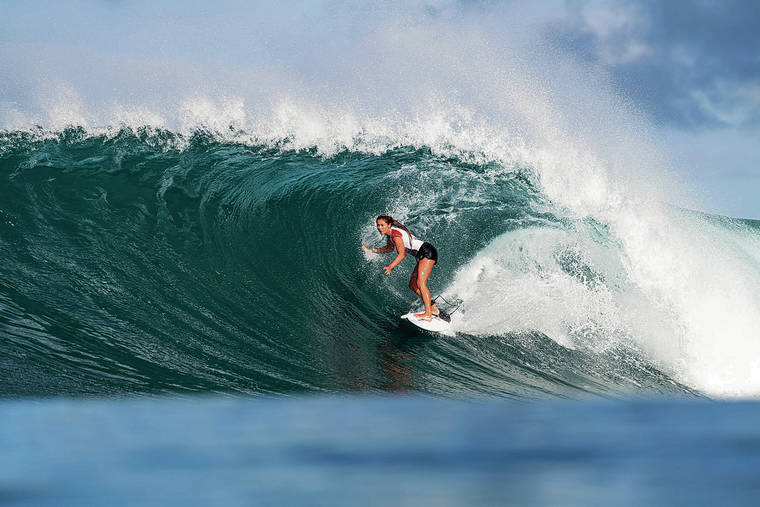Riding a wave of support from female surfers, a bill for an ordinance requiring gender equity for sports
activities requiring a park use permit, popularly known as “the surf equity bill,” was passed unanimously Wednesday by the nine-member Honolulu City Council.
Introduced in February by Council member Kym Pine, Bill 10 requires gender equity in the issuance of permits for sports activities by the Honolulu City and County Department of Parks and Recreation, in order to ensure the fair allocation of park facilities “without discrimination on the basis of gender. “
City park use permits are required for surf competitions sited at City and County beach parks, such as the World Surf League’s Billabong Pipe Masters that kicked off Tuesday at Banzai Pipeline fronting Ehukai Beach Park on Oahu’s North Shore.
In its 50 years, the Pipe Masters, for many surfers and spectators the peak of the men’s world championship tour, has been exclusively male, along with four other WSL qualifying events held on Oahu’s North Shore for the past decade. Female pros, meanwhile, have had one world championship event in Hawaii — the Maui Pro at Honolua Bay — and no qualifying events in the islands.
This has denied local women equal opportunity with men to compete and advance in their sport, according to women’s surfing advocates who testified in support of the bill.
“Bill 10 brings light to the fact that women surfers have been left out by many of the contest organizers and the city in providing equal event opportunities and the chance for (women) to be professionals,” longtime North Shore women’s contest promoter Betty “Banzai Betty” Depolito said in written testimony submitted in support of the bill.
Although Bill 10 mandates gender equity in all sports activities requiring permits in city parks, surfing was the example cited by Pine when it passed.
“I am proud that women will no longer be denied having their own Pipeline Masters during prime surf months,” Pine said, noting that as a former competitive athlete she also had struggled with gender discrimination, “and that all female athletes, no matter what sport, will have equal opportunity.”
Bill 10, introduced in February, rode forward on the momentum generated by the Jan. 20 passage of Resolution 20-12, sponsored by Council member Heidi Tsuneyoshi, which urged the city Department of Parks and Recreation and the state Department of Land and Natural Resources to adopt new permit rules for contest promoters that would allow equal opportunities for women to compete in island surf events.
Sabrina Brennan,, a staunch proponent of both the resolution and the bill, expressed disappointment that an amendment she had called for in written testimony was not addressed. Brennan is the founder of Sport Equity, an organization that works to end gender discrimination in professional athletic competitions held on public land.
The amendment, Brennan said, would close what she saw as a loophole by omitting exceptions provided in the bill.
She sought the omission of language stating the sports equity requirement “does not apply if the sports activity is limited to one gender,” or a sport’s rules prohibit the participation “of a particular gender,” or permits are made equally available “for a similar activity with participants of another gender or to participants of all genders.”
In addition, the Committee for Equity in Women’s Surfing sought a more specific amendment “to require the inclusion of a women’s division and a men’s division in all professional surfing competitions held on Oahu” with equal prize money in written commentary submitted by Brennan and Hawaii big-wave pro surfers Paige Alms, Bianca Valenti and Andrea Moller, all of whom were instrumental in opening big-wave competitions at Mavericks in Northern California to women.
Meanwhile, a women’s championship tour event, the Sunset Open at Sunset Beach, finally has been added to Oahu’s North Shore for the 2021 season. It will be held in January during the same holding period as the men’s Sunset Open.

